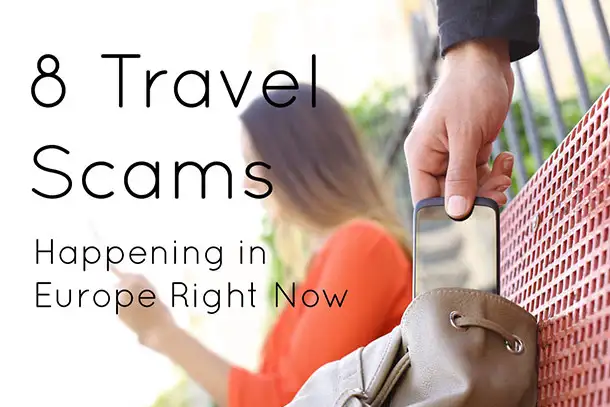
Whenever you travel, you risk falling victim to travel scams. That’s been true since Marco Polo, and while travel scams can affect anyone, knowing what to look for might help you avoid getting ripped off. AIG Europe has a helpful infographic outlining the eight most common scams currently affecting travelers in Europe. Study up so you don’t fall victim to “highway pirates” or bogus police officers on your next trip.
Italy: Puncturing Tires
Beware of “highway pirates” in Italy who will puncture your tires at a parking lot and follow you until you’re forced to stop. They will then pretend to help you while robbing you at the same time. If you do get a flat tire, be cautious about who offers to help you—especially around Naples—and never leave your valuables and luggage in your car.
France: False Petitions
Be wary of children who pretend to be disabled and claim to represent an accredited charity. They will ask for your signature—and then your money. Ignore them and report the scam to police. Organized scammers like this receive a 1 million euro fine in France.
Spain: Fake Entry Fees
Scam artists are posing with fake IDs at the Spanish border and asking for an “entry fee” into Gibraltar. There is no entry fee to pass through, so ignore anyone asking for money and keep your valuables out of sight.
Czech Republic: Impersonating a Police Officer
In this grand scam, a group of “police offers” will appear and accuse you of committing a crime. They will ask to see your wallet and passport, which is against the law, so you should refuse and ask to be taken to the nearest police station instead. This will most likely make them go away. Be sure to report them to the local authorities after.
Hungary: Counterfeit Money
Taxi drivers and dingy currency exchange booths commonly pass on counterfeit bills to unsuspecting tourists. Make sure to exchange your money only at a bank or in the airport, and double check that the bills you receive are the correct currency.
Netherlands: Distraction Scams
Pay particular attention to this at restaurants in Central Amsterdam. Someone will come into the restaurant and either pretend to look for a friend or cause another distraction. Instead he or she will steal your bag right in front of you. Make sure you keep your possessions in your line of sight, and don’t leave bags or coats hanging on the back of your chair.
Croatia: Extortionate Bills
Some Croatian bars and restaurants—especially gentleman’s clubs—will add an unexplained surcharge to your bill, expecting you to not have enough cash. If you are short on funds, they’ll take you to an ATM and demand that you to take out more money. It’s best to research restaurants, clubs, and bars before going, and ask your hotel (rather than taxi drivers, who may be in on the scam) for recommendations.
Poland: Phony Taxis
At airports and major tourist attractions in Poland, many unregulated drivers will pick up unsuspecting tourists and claim their meter is broken. Avoid this overcharge by only using official taxis, and check for the name and number of the company on the car. Another way to check their legitimacy is by checking for a rate card.
More from SmarterTravel:
- 10 Worst Tourist Scams
- 9 Surprising Travel Scams You Need to Worry About
- Top 10 European Tourist Traps
Editor’s Note: This story was originally published in 2016. It’s been updated to reflect the most current information. SmarterTravel’s Ashley Rossi originally reported, and Ed Perkins also contributed to this story.
We hand-pick everything we recommend and select items through testing and reviews. Some products are sent to us free of charge with no incentive to offer a favorable review. We offer our unbiased opinions and do not accept compensation to review products. All items are in stock and prices are accurate at the time of publication. If you buy something through our links, we may earn a commission.
Related
Top Fares From
Today's Top Travel Deals
Brought to you by ShermansTravel
Porto to Lisbon: 7-Nt, Small-Group Portugal...
Indus Travels
 vacation
$1899+
vacation
$1899+
Greenland: Luxe, All-Incl. 11-Nt Exploration Small-Ship...
Swan Hellenic



Ohio: Daily Car Rentals from Cincinnati
85OFF.com





